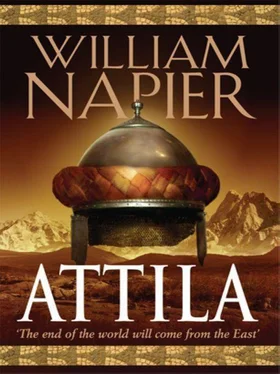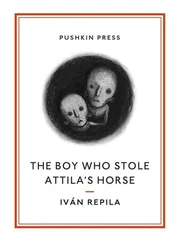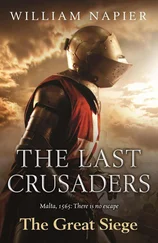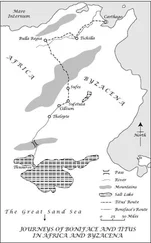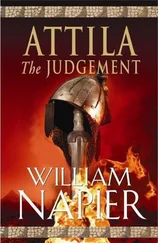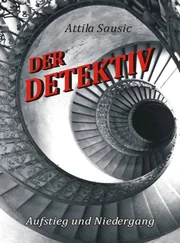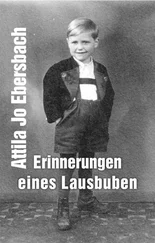William Napier - Attila
Здесь есть возможность читать онлайн «William Napier - Attila» весь текст электронной книги совершенно бесплатно (целиком полную версию без сокращений). В некоторых случаях можно слушать аудио, скачать через торрент в формате fb2 и присутствует краткое содержание. Жанр: Исторические приключения, на английском языке. Описание произведения, (предисловие) а так же отзывы посетителей доступны на портале библиотеки ЛибКат.
- Название:Attila
- Автор:
- Жанр:
- Год:неизвестен
- ISBN:нет данных
- Рейтинг книги:5 / 5. Голосов: 1
-
Избранное:Добавить в избранное
- Отзывы:
-
Ваша оценка:
- 100
- 1
- 2
- 3
- 4
- 5
Attila: краткое содержание, описание и аннотация
Предлагаем к чтению аннотацию, описание, краткое содержание или предисловие (зависит от того, что написал сам автор книги «Attila»). Если вы не нашли необходимую информацию о книге — напишите в комментариях, мы постараемся отыскать её.
Attila — читать онлайн бесплатно полную книгу (весь текст) целиком
Ниже представлен текст книги, разбитый по страницам. Система сохранения места последней прочитанной страницы, позволяет с удобством читать онлайн бесплатно книгу «Attila», без необходимости каждый раз заново искать на чём Вы остановились. Поставьте закладку, и сможете в любой момент перейти на страницу, на которой закончили чтение.
Интервал:
Закладка:
The voice was colder than any statue of marble or bronze.
He looked down. At the foot of the statue stood a young woman of twenty years or so, in an emerald-green stola, belted at the waist, her hair worn in a severe style, tightly plaited and bound round her head. It had an almost reddish tinge, and her skin was very pale. She was tall and bony, with a fine nose, a thin and sharply defined mouth, and cool green, unblinking, catlike eyes. Her physical presence was one of both brittleness and sinewy tenacity. Now she arched a cool eyebrow enquiringly, as if merely curious, or even amused at what the boy might be doing. But there was no amusement or mere curiosity in her eyes. Her eyes made the boy think of fire seen burning through a wall of ice.
‘Princess Galla Placidia,’ he whispered. ‘I-’
She wasn’t interested in explanations. ‘Get down,’ she snapped.
He got down.
She looked up at the mutilated face of Caesar Augustus. ‘He found Rome brick and left it marble,’ she said softly. ‘But you, you found him bronze, and left him… mutilated. How very characteristic.’ She looked sourly down at the boy again. ‘It is so important to know one’s enemies, don’t you think?’
The boy looked smaller than ever.
She held out her hand. ‘The other eye,’ she said.
He could feel it, still nestling there in the folds of his tunic.
‘I…’ He swallowed. ‘When I came by, one eye was already gone. I was just trying to make sure the other one wouldn’t fall out as well.’
He didn’t understand what had happened when he slammed against the wall behind him. Only when he groggily pulled himself to his feet again did he feel the side of his face stinging with pain. The livid welts of the blue tattooed scars that stood out from his cheek, the mark of his people, cut into his flesh by his mother when he was still in his cradle, tingled with increasing intensity. He touched his fingertips to his mouth, and found that the odd tickling sensation over his numbed lips was the trickle of blood.
He clutched the knife hard in his right hand and took a step forward. His teeth were furiously clenched.
Galla didn’t flinch. ‘Put it away.’
The boy stopped. He continued to clutch the knife, but he couldn’t take another step.
The princess’s eyes, both cool and burning, ice on fire, never left him. ‘You have been nothing but a plague since the day you arrived here,’ she said, her voice as cutting as Toletum steel. ‘You have had the finest Gallic tutors in Rome, to teach you rhetoric, logic, grammar, mathematics and astronomy… They have even tried to teach you Greek!’ She laughed. ‘What touching optimism! You have, of course, learnt nothing. Your table manners are a continuing disgrace, you do nothing but scowl and sneer at the other hostages, your barbarian… equals. And now you are growing destructive as well.’
‘Rhadagastus would have done much worse,’ blurted the boy.
For a fleeting instant, Galla hesitated. ‘Rhadagastus is finished,’ she said. ‘As the triumphal Arch of Honorius will demonstrate when it is unveiled at the ceremony next week. Which you will attend.’
He looked up at her wide-eyed. ‘Strange it’s not called the Arch of Stilicho, really, isn’t it? In my country, when a battle is fought and won-’
‘I am not interested in what goes on in your country. Just so long as it does not go on here.’
‘But we’re allies now, aren’t we? If it hadn’t been for the help of my people, Rome would probably be overrun with barbarians by now.’
‘Hold your tongue.’
‘And they’d do far more damage than this.’ He waved at the mutilated statue that towered over them. ‘If Rhadagastus and his warriors had got into the city, apparently they were going stuff the Senate House full of straw and set fire-’
‘I order you to hold your tongue!’ said Galla furiously, advancing towards him again.
‘-to it, and leave it and all of Rome nothing but a field of blackened rubble. As the Goths might next, they say, now that Alaric is their leader, and a just brilliant general, who-’
The princess’s cold and bony hand was raised to strike the little wretch a second time, and his slanted, malevolent Asiatic eyes glittered as he taunted her, when another voice rang out from the far corner of the courtyard.
‘Galla!’
They heard the swish of a stola over the paved floor, and there was Serena, the wife of Master-General Stilicho, advancing towards them.
Galla turned to her, hand still raised. ‘Serena?’ she said.
Serena contrived a curtsey to the princess as she hurried forward, but the look in her eyes was anything but humble or obedient. ‘Lower your hand.’
‘I beg your pardon?’
‘And you, boy, go to your room.’
He backed up against the wall and waited.
‘Do you presume to order me?’
Serena faced Galla Placidia and her eyes did not flinch. She was shorter than the princess, and perhaps twice her age, but there was no denying her beauty. Her hair was simply coiffed, and her stola of white silk left her neck and shoulders bare but for a slim necklace of Indian pearls. Her eyes, edged with fine laughter lines, were dark and lustrous, and few men in the court were strong enough to refuse her wishes when she expressed them in her low and gentle voice, turning her gaze and her wide smile full upon them. But when angered, those beautiful eyes could flash fire. They flashed fire now.
‘Do you think it wise, Princess Galla, to maltreat the grandson of our most valued ally?’
‘Maltreat, Serena? And what would you have me do when I catch him outraging one of the most precious statues in the palace?’ Galla moved almost imperceptibly nearer to her. ‘Sometimes, I wonder if you really mind about such things. One would sometimes think your sympathies were as much barbarian as Roman! Ridiculous, I know. But of course, I understand that your husband-’
‘That’s enough!’ flared Serena.
‘On the contrary, it is not nearly enough. Since your husband was of unbaptised and barbarian birth himself, I – and indeed many others in court circles, though you may be comfortably unaware of it – many of us have begun to suspect that you have difficulty in distinguishing between what is truly Roman and what is not.’
Serena smiled scornfully. ‘It has been a long time since even the emperors themselves were Roman born and bred. Hadrian was Spanish, as was Trajan. Septimius Severus was Libyan. P-’
‘I know my history, thank you,’ cut in the princess. ‘What is your point?’
‘My point is that you seem to be suggesting that my husband is not truly Roman on account of his birth. Romanitas no longer has anything to do with birth.’
‘You wilfully misunderstand me. I am rather suggesting that you and your husband’s party-’
‘We have no “party”.’
‘-are in grave danger of forgetting the very principles of Roman civilisation.’
‘When I see a grown woman striking a small boy, I do not see civilisation, Princess,’ Serena said acidly. ‘Nor do I see subtle diplomacy in evidence, when that boy is the grandson of our most valuable ally.’
‘Of course, some would argue that, since you are merely the wife of a soldier, however peculiarly… elevated that soldier may have become, your views are of no consequence. But I would not like to be so uncharitable. Or so’ – Galla Placidia smiled – ‘complacent.’
‘You see ghosts, Princess,’ said Serena. ‘You see things that are not.’ She turned aside and laid her hand on the waiting boy’s shoulder. ‘Away to your room,’ she murmured. ‘Come now.’
Together they went down to the corridor to the boy’s chamber.
Galla Placidia stood clenching and unclenching her white, bony fists for some time. Eventually she turned on her heel and strode away, sightless with fury, her silk stola sweeping the ground before her as she went. In her darting mind’s eye she saw suspicions, plots and jealousies scuttling away like malign and chattering sprites into the dark shadows of the imperial courtyards; her haunted green eyes cast restlessly from left to right as she walked, and found nothing worth their constancy.
Читать дальшеИнтервал:
Закладка:
Похожие книги на «Attila»
Представляем Вашему вниманию похожие книги на «Attila» списком для выбора. Мы отобрали схожую по названию и смыслу литературу в надежде предоставить читателям больше вариантов отыскать новые, интересные, ещё непрочитанные произведения.
Обсуждение, отзывы о книге «Attila» и просто собственные мнения читателей. Оставьте ваши комментарии, напишите, что Вы думаете о произведении, его смысле или главных героях. Укажите что конкретно понравилось, а что нет, и почему Вы так считаете.
